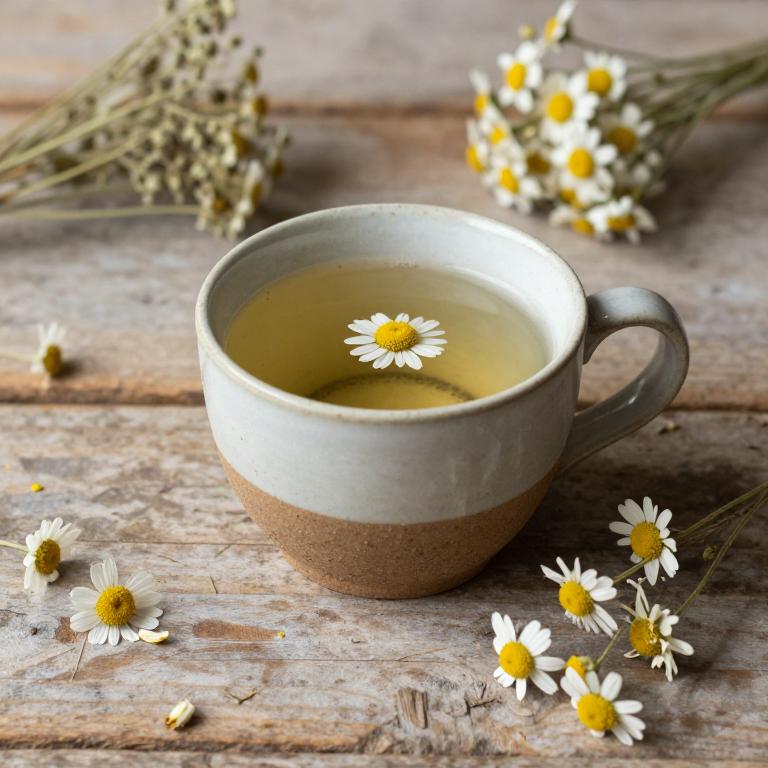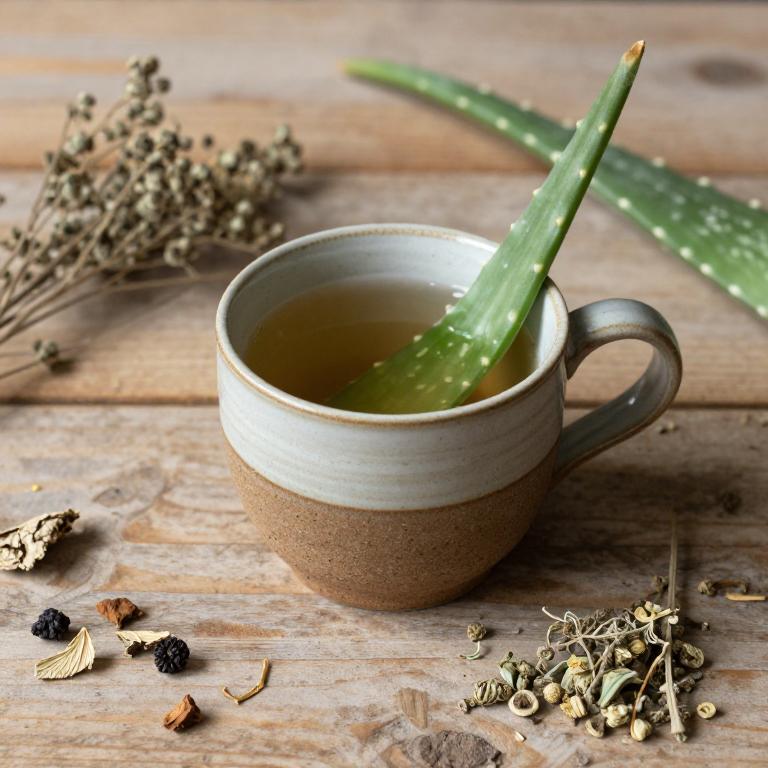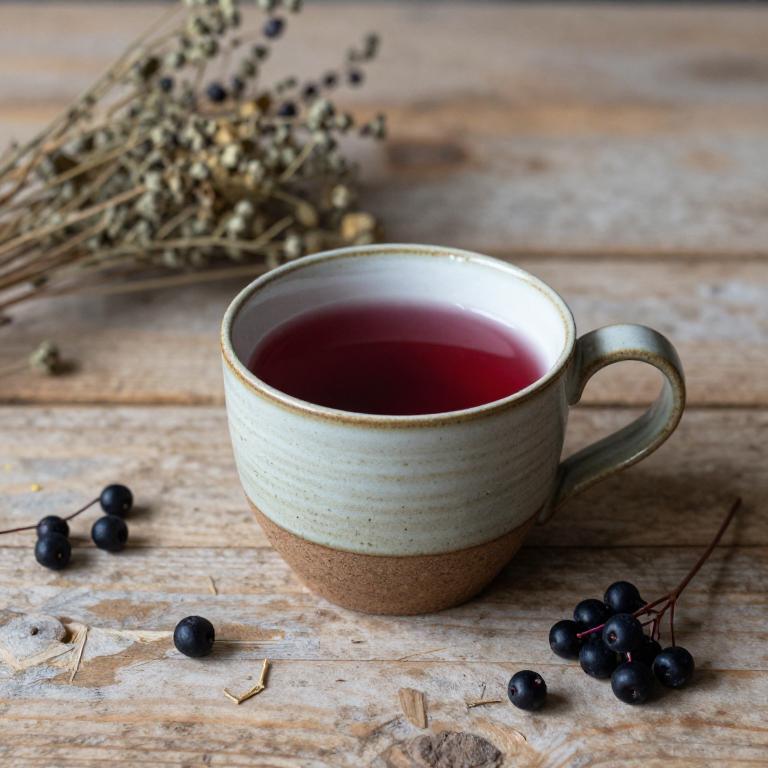10 Best Herbal Teas For Open Pores

Herbal teas can be beneficial for individuals with open pores due to their natural ingredients that help regulate sebum production and reduce inflammation.
Ingredients like green tea, chamomile, and lavender are known for their antioxidant and soothing properties, which can improve skin texture and minimize the appearance of pores. These teas can be applied topically as a compress or used in face masks to nourish and balance the skin's oil levels. Regular use of herbal teas may help prevent excess oil buildup and promote a clearer, more refined complexion.
Incorporating herbal teas into a skincare routine can be a gentle and effective way to support healthy skin and address concerns related to open pores.
Table of Contents
- 1. Camellia (Camellia sinensis)
- 2. Salvia (Salvia officinalis)
- 3. Stinging nettle (Urtica dioica)
- 4. Chamomile (Matricaria chamomilla)
- 5. German chamomile (Chamomilla recutita)
- 6. St. john's wort (Hypericum perforatum)
- 7. Dog rose (Rosa canina)
- 8. Blessed thistle (Cnicus benedictus)
- 9. Aloe vera (Aloe barbadensis)
- 10. Black elderberry (Sambucus nigra)
1. Camellia (Camellia sinensis)

Camellia sinensis, the plant from which green, black, and white teas are derived, is often used in herbal teas for its potential benefits in addressing open pores.
These teas contain antioxidants and polyphenols that may help regulate sebum production, reducing excess oil that can contribute to enlarged or open pores. Regular consumption of Camellia sinensis herbal teas may support skin health by promoting a clearer, more balanced complexion. While internal consumption may offer some benefits, topical application of tea extracts is also commonly explored for its skin-rejuvenating properties.
However, individual results may vary, and it is advisable to consult a dermatologist for personalized skincare recommendations.
2. Salvia (Salvia officinalis)

Salvia officinalis, commonly known as sage, has been traditionally used in herbal teas for its various health benefits, including its potential to help with open pores.
The essential oils in sage leaves, such as thujone and cineole, are believed to have astringent properties that may help tighten the skin and reduce the appearance of pores. When brewed into a tea, sage can be applied topically as a compress or used internally to support overall skin health. However, it is important to note that sage tea should be used with caution, as excessive consumption may have side effects.
Overall, sage herbal tea is a natural remedy that may offer gentle support for those looking to address skin concerns like open pores.
3. Stinging nettle (Urtica dioica)

Urtica dioica, commonly known as stinging nettle, is a potent herb that has been used for centuries in traditional medicine for its various health benefits.
When brewed into a herbal tea, Urtica dioica can help support skin health by reducing inflammation and promoting detoxification. This tea is particularly beneficial for individuals with open pores, as it may help regulate sebum production and tighten the skin’s surface. The high concentration of antioxidants and minerals in stinging nettle tea can also contribute to overall skin rejuvenation.
However, it is important to consult with a healthcare professional before incorporating this tea into your routine, especially if you have sensitive skin or existing health conditions.
4. Chamomile (Matricaria chamomilla)

Matricaria chamomilla, commonly known as chamomile, is a popular herbal tea often used for its calming and soothing properties.
This plant-based infusion is particularly beneficial for those with open pores, as it contains compounds that help regulate sebum production and reduce inflammation in the skin. Chamomile tea is rich in antioxidants and anti-inflammatory agents, which can help minimize the appearance of pores and improve overall skin texture. When applied topically or consumed internally, it can support a clearer, more balanced complexion.
Regular use of chamomile herbal tea may contribute to a healthier skin barrier, making it a valuable natural remedy for those seeking to address open pores.
5. German chamomile (Chamomilla recutita)

Chamomilla recutita, commonly known as German chamomile, is a popular herbal tea known for its calming and anti-inflammatory properties.
When used for open pores, chamomile tea can help reduce excess oil production and soothe irritated skin due to its high concentration of flavonoids and antioxidants. The tea's natural antiseptic qualities may also help in preventing bacterial growth that can contribute to pore visibility. Regular use of chamomile tea as a facial rinse or compress can promote skin clarity and a more even complexion.
However, it is important to patch test before use, as some individuals may experience allergic reactions to this herb.
6. St. john's wort (Hypericum perforatum)

Hypericum perforatum, commonly known as St. John's Wort, is a herbal plant that has been traditionally used for its potential health benefits, including its calming effects on the skin.
While it is more widely recognized for its use in treating mild depression, some people also use hypericum perforatum herbal teas for their purported benefits on skin health, particularly in relation to open pores. The tea is believed to have anti-inflammatory and antioxidant properties that may help reduce redness and irritation, which can contribute to the appearance of open pores. However, it is important to note that scientific evidence supporting its specific efficacy for pore-related concerns is limited, and individuals should consult with a healthcare professional before incorporating it into their skincare routine.
As with any herbal remedy, it is essential to consider potential interactions with other medications and ensure proper usage to avoid adverse effects.
7. Dog rose (Rosa canina)

Rosa canina, commonly known as rosehip, is a popular herbal ingredient used in teas due to its rich nutritional profile and potential skin benefits.
This herbal tea is believed to support skin health by providing essential vitamins, particularly vitamin C, which can promote collagen production and enhance skin elasticity. For individuals with open pores, rosehip tea may help in maintaining a balanced skin pH and reducing excess sebum production, which can contribute to pore visibility. Its anti-inflammatory properties may also soothe irritated skin and improve overall complexion clarity.
While more research is needed, many users report that regular consumption of rosehip tea can lead to a more refined and radiant skin appearance over time.
8. Blessed thistle (Cnicus benedictus)

Cnicus benedictus, commonly known as blessed thorn or St. Benedict's herb, has been traditionally used in herbal medicine for its potential benefits in skin care, particularly for those with open pores.
This herb is believed to support the health of the skin by promoting detoxification and balancing oil production, which can help reduce the appearance of enlarged pores. When prepared as a herbal tea, Cnicus benedictus may help soothe inflammation and improve the overall texture of the skin. Its antioxidant properties are thought to protect the skin from environmental damage, contributing to a more refined complexion.
While more scientific research is needed, many herbalists and natural skincare enthusiasts recommend it as a gentle, natural remedy for maintaining clear and healthy skin.
9. Aloe vera (Aloe barbadensis)

Aloe barbadensis, commonly known as aloe vera, is a popular herbal ingredient used in teas for its soothing and skin-repairing properties.
When brewed into a herbal tea, aloe vera can help reduce inflammation and redness, making it beneficial for those with open pores. The gel-like substance in aloe vera contains antioxidants and nutrients that may help regulate sebum production, which can contribute to pore visibility. Regular consumption of aloe barbadensis tea may support overall skin health and improve the appearance of pores over time.
However, it is important to consult a healthcare professional before incorporating it into your routine, especially if you have any pre-existing conditions or are taking medications.
10. Black elderberry (Sambucus nigra)

Sambucus nigra, commonly known as European elderberry, is often used in herbal teas for its potential skin benefits, including the treatment of open pores.
This herb is rich in antioxidants, vitamins, and anti-inflammatory compounds that may help reduce skin irritation and promote a more even texture. When brewed into a tea, sambucus nigra can be applied topically or consumed internally to support overall skin health. Some proponents believe that its astringent properties may help tighten pores and improve skin clarity.
However, it is important to consult a healthcare professional before using sambucus nigra, especially for those with sensitive skin or existing health conditions.